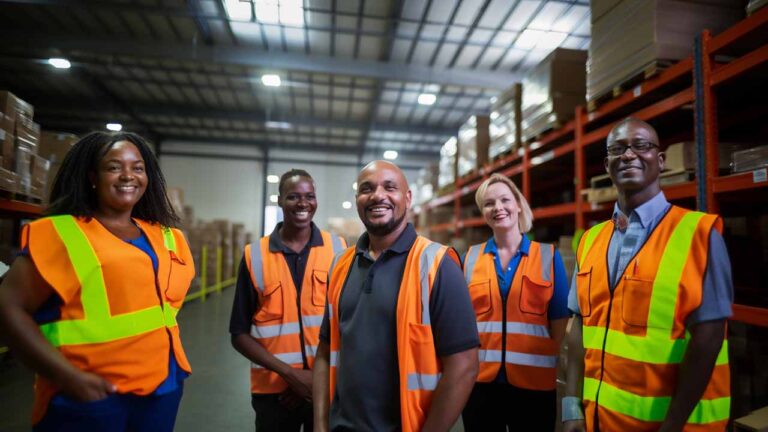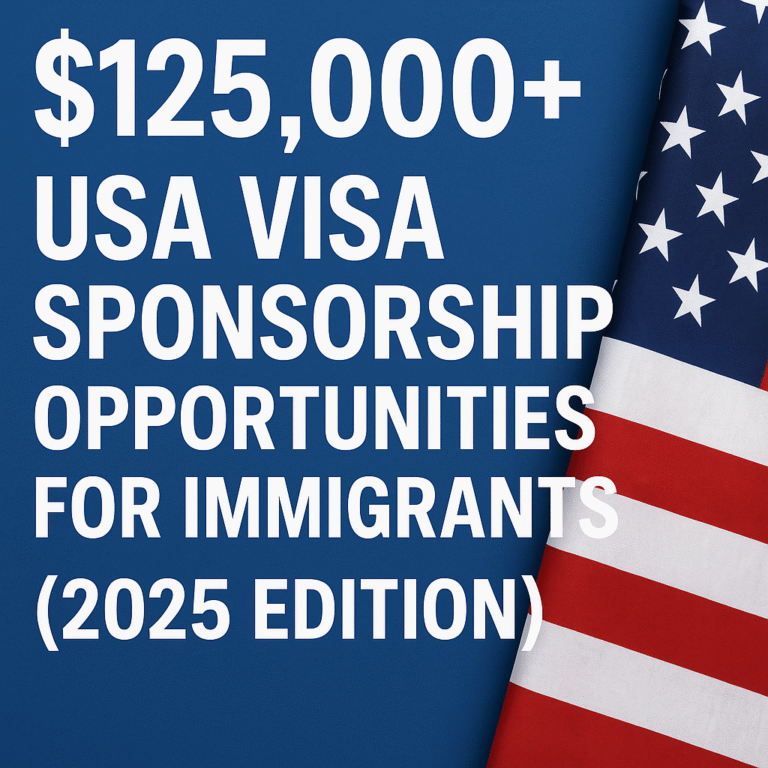Germany Visa for Immigrants – Visa Sponsorship in Germany (2025 Guide)
If you’ve ever dreamed of living and working in the heart of Europe, Germany might be the perfect destination for you. With a booming economy, world-class healthcare, free education, and a strong demand for skilled labor, Germany has become a hotspot for immigrants from around the globe. Especially in 2025, as the country continues to address its skilled labor shortage, there’s never been a better time to explore visa sponsorship opportunities.
Visa sponsorship plays a crucial role for non-EU citizens who want to build a life in Germany. Simply put, without it, your chances of legally working and residing in the country can be slim. But don’t worry—this guide is designed to walk you through everything, from understanding visa types to finding a job with sponsorship, and ultimately securing your place in Germany. Whether you’re a tech professional, healthcare worker, engineer, or recent graduate, there’s something here for you.
We’ll explore the step-by-step process of securing a visa, share tips to stand out in a competitive job market, and provide valuable resources to help you settle down smoothly. Ready to take the first step toward a new life? Let’s dive into the details.
Understanding the German Visa System
Navigating the German visa system can feel overwhelming, especially if you’re applying for the first time. But once you understand the basics, it all starts to make sense. Germany offers a range of visa types tailored to different purposes, from work and study to family reunification and business.
Types of German Visas
Here’s a breakdown of the most relevant visa types for immigrants looking to work in Germany:
- Work Visa: Designed for individuals who already have a job offer from a German company. Visa sponsorship is a must for this.
- Job Seeker Visa: Allows you to stay in Germany for six months while looking for a job. However, you must convert this to a work visa once you get an offer.
- EU Blue Card: A premium option for highly skilled non-EU workers, particularly in IT, engineering, and healthcare. It comes with perks like easier residency and family reunification.
- Family Reunion Visa: If your spouse or parent is already living legally in Germany, you can join them under this visa.
Who Needs a Visa to Work in Germany?
If you’re a non-EU citizen, you generally need a visa to live and work in Germany. Citizens from countries like the USA, Canada, Australia, and Japan can enter without a visa but must apply for a residence permit once they arrive. Others need to secure a visa before traveling.
Remember, just having a visa isn’t enough—you’ll also need a job offer and often a sponsoring employer. That’s why understanding visa sponsorship is critical if you’re aiming to make Germany your new home.
What is Visa Sponsorship in Germany?
Visa sponsorship can be your golden ticket to working legally in Germany. But what exactly does it mean?
Definition and Concept
Visa sponsorship means that a company in Germany is willing to hire you and support your visa application process. They provide a formal job offer and necessary documents to the German immigration authorities, confirming they need your skills and are ready to employ you. This is often required for non-EU applicants because Germany wants to ensure that only qualified professionals are brought in to fill genuine labor shortages.
Why Companies Sponsor Foreign Workers
Germany is facing a significant skills gap in 2025, especially in sectors like IT, engineering, nursing, and construction. With an aging population and not enough young professionals to fill vacancies, companies are increasingly turning to global talent.
Businesses are willing to sponsor visas because:
- They can’t find local talent with the required skills.
- They want to remain competitive in a fast-paced global economy.
- The government supports international hiring to maintain economic growth.
Key Benefits for Immigrants
Being sponsored comes with major advantages:
- Legal permission to work in Germany.
- Access to long-term residency options.
- Easier path for family reunification.
- Opportunity to apply for permanent residency and even citizenship over time.
In short, if you’re serious about building a future in Germany, finding an employer willing to sponsor you is one of the smartest moves you can make.
Germany’s Skilled Worker Immigration Act (2025 Update)
Germany has been progressively updating its immigration policies to attract international talent, and 2025 marks a pivotal year with key changes in the Skilled Worker Immigration Act.
New Reforms and Changes in 2025
In 2025, the German government introduced streamlined visa procedures and expanded the list of recognized professions for skilled immigration. These reforms include:
- Faster processing times for visa applications.
- Simplified credential recognition for foreign degrees and diplomas.
- Lower minimum salary thresholds for Blue Card applicants.
- Introduction of the “Opportunity Card” (Chancenkarte) for easier job seeking.
These changes aim to attract not just the highly qualified but also skilled tradespeople, technicians, and even semi-skilled workers in industries facing acute labor shortages.
Impact on Foreign Skilled Workers
These reforms mean better access and less red tape for workers around the globe. If you have the qualifications and experience, you now stand a greater chance of getting hired and sponsored, especially in high-demand sectors like healthcare, logistics, IT, and manufacturing.
Even better? Companies are encouraged through government incentives to sponsor foreign workers, so visa sponsorships are more accessible than ever.
Role of Visa Sponsorship Under the New Law
Under the 2025 framework, employer sponsorship remains a cornerstone of the immigration process. The new law supports digital application portals and employer registration systems to make the process smoother for both parties.
That means if you find a job, your employer can now process sponsorship documents much faster—sometimes in just a few weeks instead of months. This is a big win for both workers and employers alike.
How to Find Visa Sponsorship Jobs in Germany
So, how do you actually land a job with visa sponsorship in Germany? It starts with knowing where to look and what industries are hiring.
Top Websites and Platforms
Here are the best places to start your job hunt:
- Make It in Germany (official government site)
- LinkedIn – filter jobs with visa sponsorship.
- StepStone.de
- Indeed.de
- Glassdoor
- Xing – Germany’s version of LinkedIn.
Use keywords like “Visa Sponsorship”, “Relocation Assistance”, and “English-speaking” when searching.
In-Demand Professions in 2025
Germany’s 2025 labor shortage is hitting hard in these sectors:
- Software Development and IT Security
- Mechanical and Electrical Engineering
- Nursing and Elderly Care
- Skilled Trades (plumbers, electricians)
- Truck Drivers and Warehouse Operators
- Scientists and Medical Technicians
If you’ve got experience in any of these, you’re already ahead of the game.
Companies Actively Offering Sponsorship
Some big names are constantly looking for international talent and often provide sponsorship:
- Siemens
- SAP
- Bosch
- Deutsche Telekom
- BMW Group
- DHL
- Zalando
- BioNTech
Look for their career pages and filter by “Relocation” or “Visa support”.
Step-by-Step Process to Get a Sponsored Visa
Securing a visa sponsorship in Germany may sound intimidating, but the process is actually very structured. The key is to approach each stage methodically.
Job Search and Application
The first step is to identify suitable job opportunities in your field. Tailor your resume to German standards—use a professional format, include a photo (which is common in Germany), and make sure to translate documents into German when necessary. Highlight international experience and technical skills, and include any German language proficiency, even if minimal.
Use job portals like StepStone, LinkedIn, and Glassdoor. Filter for companies that provide “visa sponsorship” or “relocation assistance.” Set job alerts so you don’t miss new opportunities.
Apply with personalized cover letters. German employers appreciate attention to detail, so avoid generic templates. Always explain why you’re a good fit for their specific company and how you’ll contribute value.
Offer Letter and Sponsorship
Once you receive a job offer, the employer initiates the sponsorship process. This involves providing a formal job contract and completing documentation with the Federal Employment Agency (Bundesagentur für Arbeit), which verifies that the position cannot be filled by an EU candidate and that you meet salary requirements.
The employer’s responsibility is to fill out sponsorship paperwork and sometimes assist with visa paperwork. Some companies also help with relocation, housing, and language classes.
Submitting Your Visa Application
With the offer and sponsorship letter in hand, you’ll apply for a work visa at your local German embassy or consulate. This usually includes:
- Completing the application form
- Providing biometrics
- Attending a short interview
The entire process can take anywhere from 4 to 12 weeks, so apply early.
Interview and Documentation
You may be required to attend an interview either at the embassy or virtually. Questions typically cover your job role, your qualifications, and your intent to live and work in Germany long-term.
Be prepared to present documents like your job contract, passport, proof of qualifications, and proof of language skills (if applicable). Make sure translations are certified and notarized if required.
Once approved, you’ll receive a national visa to enter Germany. You’ll then apply for a residence permit (Aufenthaltstitel) within 90 days of arriving.
Required Documents for a German Sponsored Work Visa
Getting your documents right is critical for a successful visa application. Missing or incorrect paperwork can lead to delays or outright rejections.
Personal Documents
- Passport: Must be valid for at least 6 months beyond your planned stay.
- Biometric photos: Taken recently with specific dimensions (as per German visa standards).
- Visa application form: Fully filled, signed, and dated.
- Cover letter: Explaining why you’re applying, your job offer, and your intention to work and live in Germany.
Employment-Related Documents
- Job offer/contract: Clearly stating your role, salary, working hours, and duration.
- Sponsorship letter: Provided by the employer, confirming their intent to sponsor your visa.
- Approval from the Federal Employment Agency (ZAV): If required, proving that the job cannot be filled by a local.
Educational and Qualification Proofs
- University degrees and certificates: These may need to be recognized in Germany (check via ANABIN database).
- Professional licenses: Especially for regulated professions like healthcare or engineering.
- Curriculum Vitae (CV): In German or English, including work history and references.
Always double-check the embassy website for updated requirements based on your country of residence. It’s also a good idea to keep multiple copies of each document, both physical and digital.
Visa Processing Time and Fees (2025)
How Long It Takes
In 2025, thanks to digitalization and policy reforms, the average visa processing time for sponsored work visas has reduced significantly. Here’s what you can expect:
- Standard processing: 4 to 10 weeks
- Priority processing (if eligible): 2 to 3 weeks
The processing time also depends on the workload of the embassy or consulate in your country and whether your paperwork is complete and accurate.
Fees Involved
- Visa application fee: €75 (paid in local currency)
- Certification/translation of documents: €20–€50 per document
- Courier fees (if applicable): Varies
Some employers cover these costs as part of the sponsorship package, so it’s worth asking during your negotiations.
Expedited Options
While Germany doesn’t officially offer premium visa services like some countries, certain embassies provide expedited appointments or priority processing for skilled workers. To qualify, you typically need a job offer in a shortage occupation or from a recognized company.
Tip: Once you get the job contract, don’t delay your application. Book an appointment immediately, as wait times can vary widely.
Challenges Faced by Immigrants and How to Overcome Them
Moving to a new country is never without challenges, but the good news is, every hurdle has a solution.
Language Barriers
One of the most common difficulties is the German language. While many jobs—especially in IT, engineering, and research—don’t require fluency, day-to-day life often does. From renting an apartment to opening a bank account, knowing basic German is incredibly helpful.
Solutions:
- Start learning before you arrive (apps like Duolingo, Babbel, or online courses).
- Enroll in integration or language courses upon arrival (some are free or subsidized).
- Practice daily—try joining local meetups or language exchange groups.
Cultural Adaptation
German culture is known for its punctuality, structure, and directness. This can feel very different if you’re used to more relaxed social norms.
Solutions:
- Be open-minded and curious—observe how locals interact.
- Read about German customs and etiquette.
- Build a local support system by joining expat communities or hobby clubs.
Legal and Bureaucratic Hurdles
From getting your visa to registering your address (Anmeldung) and obtaining health insurance, Germany’s bureaucracy can be slow and complex.
Solutions:
- Prepare all documents in advance and make appointments early.
- Ask your employer for assistance or consider hiring relocation services.
- Use online expat forums to find step-by-step guidance from others who’ve gone through the same.
Once you get through the initial adjustment period, life in Germany becomes much easier. It’s a country that rewards organization and effort—with time, you’ll thrive.
Life in Germany for Sponsored Immigrants
So what is life actually like for immigrants who make it to Germany on a sponsored visa?
Cost of Living
Germany offers a relatively balanced cost of living compared to other Western countries. While cities like Munich, Frankfurt, and Hamburg are more expensive, smaller cities like Leipzig, Dresden, and Hannover are much more affordable.
Average monthly expenses:
- Rent: €700–€1,200 (depending on city)
- Groceries: €200–€300
- Public transport: €49/month with the Deutschlandticket
- Health insurance: Covered through employer (usually €300–€400)
Your salary as a skilled worker should comfortably cover living expenses, especially if your job includes relocation benefits.
Work Culture
German workplaces are known for being structured, punctual, and highly efficient. Work-life balance is prioritized, with strong labor protections and generous vacation policies (usually 25–30 days annually).
Expect clear job roles, direct communication, and a strong focus on quality over quantity. Hierarchies exist but are less rigid than in some other countries, and collaboration is encouraged.
Opportunities for Family and Children
One of the biggest advantages of being on a sponsored visa is the opportunity to bring your family with you. Spouses and children can often apply for residence permits at the same time.
Germany also offers:
- Free or low-cost education
- Subsidized childcare
- World-class healthcare
- Child benefits (Kindergeld) for each child
For many immigrants, Germany is not just a place to work—it’s a place to build a future.
Tips to Increase Your Chances of Getting Sponsored
In a competitive job market, simply having qualifications isn’t enough. You need to stand out, especially when applying from outside the EU. Here’s how to dramatically improve your chances of getting visa sponsorship in Germany.
Building a Strong Resume and LinkedIn Profile
German employers expect a clean, well-structured CV that highlights skills, experience, and certifications. Stick to a maximum of two pages and include:
- A professional photo (common in Germany)
- Contact info, including LinkedIn
- Clear career objectives
- Bullet points for work experience
- Education and training details
- Language skills and technical proficiencies
On LinkedIn, update your headline to include “Open to Relocation” and specify “Germany” as your target location. Connect with recruiters in your industry and post regular updates to remain active and visible.
Networking Strategies
Over 70% of jobs in Germany are filled through networking. This isn’t just about handing out resumes—it’s about building genuine professional relationships.
- Join LinkedIn groups relevant to your industry in Germany.
- Attend virtual and local job fairs.
- Connect with alumni or fellow countrymen already working in Germany.
- Engage with recruiters on LinkedIn or Xing (Germany’s professional network).
Don’t be afraid to send cold messages to hiring managers or HR departments—just keep them polite, personalized, and professional.
Learning the German Language
Even if the job is in English, speaking German is a huge advantage. Many employers prefer candidates who can integrate into the workplace and society more easily.
Start learning the basics through platforms like:
- Duolingo or Babbel (apps for beginners)
- Goethe-Institut (recognized courses)
- YouTube tutorials (free lessons)
If you’re aiming for customer-facing or healthcare roles, achieving at least a B1 or B2 level in German can significantly boost your chances of landing a job with sponsorship.
Alternatives If You Can’t Get Sponsorship
What if you’ve tried everything but haven’t landed a sponsored job? Don’t lose hope—Germany offers several alternative routes to eventually land a work visa.
Freelance Visa
If you work in a creative or tech-related field (e.g., writing, photography, software development), you might be eligible for a freelance visa (Freiberufler).
Requirements typically include:
- A portfolio of your work
- Letters of intent from German clients
- Proof of income to support yourself
It allows you to work with German clients, live in Germany, and even transition to permanent residency over time.
Job Seeker Visa
This visa allows you to enter Germany for six months while looking for a job. You must prove you have enough funds to support yourself during that time and have a recognized degree.
It’s a great option if you can’t get hired from abroad but are confident you’ll land a job once in Germany.
Key Tip: During your stay, attend job fairs, build a local network, and be proactive—most successful applicants find jobs within the first few months.
Student Visa as a Pathway
If you’re younger or looking to switch careers, studying in Germany is an excellent option. Tuition is often free or low-cost, and after graduation, you can stay for up to 18 months to find work.
Many international students eventually get sponsored for full-time positions and transition to permanent residency.
Permanent Residency and Citizenship Opportunities
Once you’ve settled into life in Germany, you’ll likely start thinking about long-term stability. Fortunately, Germany offers clear pathways to permanent residency and citizenship.
Transition from Work Visa to Permanent Residency
If you’ve worked in Germany for at least 33 months on a Blue Card—or 21 months if you speak B1-level German—you can apply for a settlement permit (Niederlassungserlaubnis).
Other work visa holders usually qualify after 4 to 5 years of continuous employment.
Benefits of permanent residency:
- No more visa renewals
- Freedom to change employers
- Access to government benefits
- Easier loan approvals for housing or business
Eligibility for Citizenship
To become a German citizen, you generally need:
- 5–8 years of legal residence
- B1-level German proficiency
- Knowledge of German society (via integration test)
- Financial independence
- No serious criminal record
Once approved, you’ll receive a German passport and full voting rights.
Dual Citizenship in Germany
As of 2024, Germany now allows dual citizenship for most non-EU nationals—a major shift from past rules. This means you can retain your original nationality while becoming a German citizen.
It’s especially great news for immigrants who want to stay connected to their roots while enjoying the full benefits of life in Germany.
Real Stories and Testimonials
Let’s hear from real people who’ve successfully navigated the visa sponsorship process in Germany.
Success Stories of Sponsored Immigrants
Mohammed from India (IT Specialist):
“I applied to more than 100 companies before finally getting an offer from a tech startup in Berlin. They sponsored my visa and helped me find housing. Within a year, I moved my wife and daughter here too. Germany has been life-changing for us.”
Linda from Kenya (Nurse): “The process was long but worth it. I took a German language course to reach B2 level, and that made all the difference. I now work in a hospital in Munich, and I’m on track for permanent residency.”
Ali from Pakistan (Mechanical Engineer): “I moved to Hamburg in 2023 with sponsorship from a manufacturing company. I’m now helping my brother apply too. The culture, the structure—it just works for me.”
Lessons from Common Mistakes
- Applying to generic job ads without a tailored CV
- Ignoring German language learning
- Not verifying if degrees are recognized in Germany
- Missing deadlines or submitting incomplete documents
By learning from others’ journeys, you can avoid common pitfalls and fast-track your own success story.
Conclusion
Germany is more than just a country with castles and bratwurst—it’s a land of opportunity for skilled immigrants from all over the world. Thanks to ongoing policy reforms in 2025, visa sponsorship has become more accessible than ever, making this the perfect time to pursue your dream.
Whether you’re an IT expert, nurse, engineer, or skilled tradesperson, there are real opportunities waiting for you. The key lies in knowing where to look, preparing your application thoroughly, building your language skills, and never giving up—even if the first few attempts don’t succeed.
Germany offers not just jobs, but a chance at stability, growth, and a future for you and your family. Ready to take the leap? Your new life in Germany might be just a sponsored job offer away.
FAQs
- What jobs are most likely to get sponsorship in Germany? Tech roles, engineering, healthcare (especially nursing), logistics, and skilled trades like electricians and welders are in high demand and often come with sponsorship.
- Is German language proficiency mandatory for visa sponsorship? Not always, especially for IT and research roles. But for customer-facing or healthcare jobs, at least a B1 or B2 level is usually required.
- Can I bring my family if I’m on a sponsored visa? Yes, most work visa types allow for family reunification. Spouses and children can apply for residence permits alongside the primary applicant.
- How long does it take to get permanent residency? Typically 4–5 years for most visa holders, or as little as 21–33 months for Blue Card holders with German language proficiency.
- Can I switch jobs after getting a sponsored visa? Yes, but you must inform the immigration office and sometimes reapply for a new work permit if the new job is substantially different.





